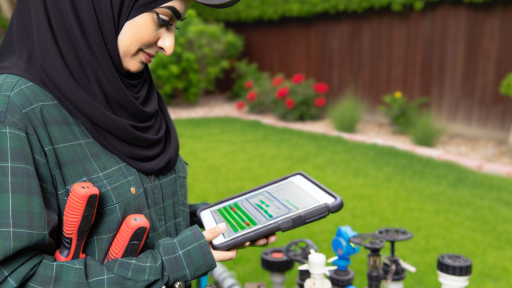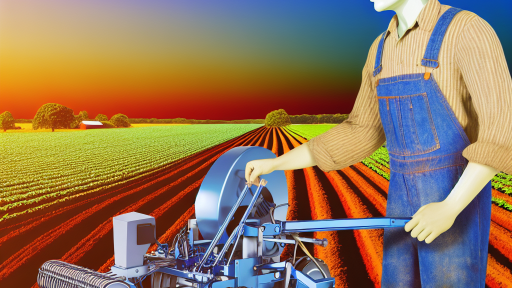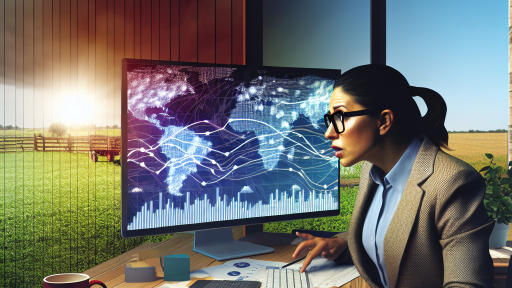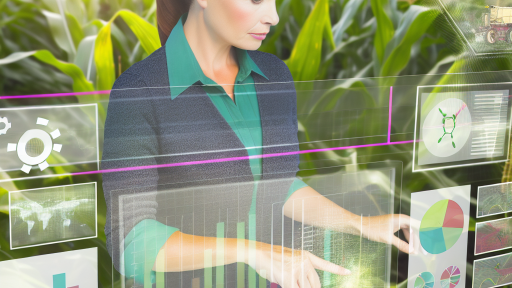Overview of Smart Irrigation Technology and its Importance in Agriculture
Smart irrigation technology transforms how farmers manage water resources.
This technology integrates advanced systems to optimize water use efficiency.
Farmers face increasing challenges due to climate change and water scarcity.
Consequently, adopting smart irrigation solutions becomes crucial.
Understanding Smart Irrigation
Smart irrigation uses sensors, weather data, and algorithms.
These systems monitor soil moisture levels in real-time.
Moreover, they adjust water application based on crop needs.
This process minimizes overwatering and enhances crop health.
Benefits of Smart Irrigation Technology
Smart irrigation significantly reduces water consumption.
Consequently, farmers can cut costs related to water usage.
Additionally, this technology promotes sustainable farming practices.
- Improved crop yields
- Reduced labor costs
- Enhanced nutrient management
Current Trends in Smart Irrigation
Integration of IoT devices has revolutionized irrigation practices.
These devices provide farmers with data-driven insights.
Remote monitoring capabilities also allow for real-time decision-making.
Furthermore, advancements in drone technology are emerging.
Transform Your Agribusiness
Unlock your farm's potential with expert advice tailored to your needs. Get actionable steps that drive real results.
Get StartedDrones offer aerial assessments of crop health and moisture levels.
Challenges and Considerations
Despite the advantages, some challenges remain.
Initial costs of smart irrigation systems can be high for farmers.
Additionally, reliable internet access is essential for full functionality.
Farmers must also consider equipment maintenance and training.
The Future of Smart Irrigation Technology
As technology evolves, smart irrigation will become more accessible.
Integration with renewable energy sources is a promising avenue.
Moreover, ongoing research continues to improve system efficiency.
Ultimately, smart irrigation technology represents a significant leap towards sustainable agriculture.
Key Components of Smart Irrigation Systems
Sensors
Sensors play a crucial role in smart irrigation systems.
They gather real-time data on soil moisture, temperature, and humidity.
These devices help farmers make informed irrigation decisions.
Various sensor types exist, including soil moisture and weather sensors.
Soil moisture sensors measure the water content in the soil.
Weather sensors track local climatic conditions for better planning.
Moreover, some systems offer remote monitoring capabilities.
This feature allows farmers to access data from anywhere.
Software
Software is essential for managing and analyzing irrigation data.
It helps farmers automate watering schedules based on sensor readings.
Many platforms provide user-friendly dashboards for real-time monitoring.
Farmers can analyze historical data to improve irrigation efficiency.
Additionally, predictive analytics can foresee irrigation needs.
Some software integrates with mobile applications for convenience.
This integration fosters timely communication and decision-making.
Showcase Your Farming Business
Publish your professional farming services profile on our blog for a one-time fee of $200 and reach a dedicated audience of farmers and agribusiness owners.
Publish Your ProfileHardware
Hardware components ensure the functionality of smart irrigation systems.
Irrigation controllers manage the watering systems based on inputs from sensors.
Additionally, pumps are necessary for water distribution across fields.
Drip irrigation systems help deliver water directly to plant roots.
Hardware installation can be customized based on farm layout and crops.
Advanced systems also include automated valves for precise control.
Ultimately, quality hardware enhances overall irrigation performance.
Recent Innovations in Smart Irrigation
Autonomous Systems in Irrigation
Autonomous systems revolutionize smart irrigation practices.
These systems use sensors and weather data for real-time management.
Farmers benefit from reduced labor costs and increased efficiency.
As a result, crop yields improve due to optimized water usage.
Technologies such as drones assess water needs across large fields.
AI Integration and Data Analysis
Artificial intelligence enhances decision-making in irrigation systems.
AI processes data from multiple sources to forecast water needs.
This integration enables farmers to customize watering schedules.
Consequently, AI-driven systems lead to better resource allocation.
Predictive analytics can minimize waste by anticipating weather changes.
Benefits of Smart Irrigation Technologies
Smart irrigation technologies offer numerous advantages for agriculture.
- They conserve water and reduce costs for farmers.
- Efficient water use promotes sustainability in farming practices.
- Farmers can monitor their fields remotely, improving management.
Challenges in Adoption
Despite their benefits, challenges remain in adopting smart irrigation.
Initial setup costs can be high for many farmers.
Moreover, not all regions have reliable internet access for data transmission.
Additionally, training is necessary for effective technology use.
Future of Smart Irrigation Technology
The future looks bright for smart irrigation innovation.
As technology advances, costs are expected to decrease.
New developments in IoT will further enhance irrigation systems.
Farmers will increasingly rely on data-driven decisions.
Ultimately, these advancements will support global food security.
Find Out More: Data-Driven Farming Using Agricultural Robots
Benefits of Smart Irrigation
Water Conservation
Smart irrigation technology significantly reduces water usage in agriculture.
This technology relies on data-driven methods to optimize watering schedules.
For instance, sensors measure soil moisture levels accurately.
As a result, farmers can avoid overwatering crops.
Consequently, this approach helps maintain local water resources.
Moreover, it can lead to lower utility bills for farmers.
This also means reduced energy consumption for water pumping.
In many cases, smart irrigation can use up to 50% less water.
Yield Improvement
Smart irrigation enhances crop yield by providing precise water needs.
Crops can receive adequate water at critical growth stages.
This careful management optimizes conditions for plant growth.
Furthermore, healthier plants are more resistant to pests and diseases.
Showcase Your Farming Business
Publish your professional farming services profile on our blog for a one-time fee of $200 and reach a dedicated audience of farmers and agribusiness owners.
Publish Your ProfileFarmers report increased harvests due to improved irrigation practices.
Additionally, smart irrigation technologies can monitor weather forecasts.
With this data, farmers can adjust watering based on rain predictions.
This proactive approach minimizes water waste and enhances productivity.
Ultimately, smart irrigation contributes to a sustainable agricultural ecosystem.
Learn More: Understanding Smart Irrigation Sensors
Challenges and Limitations of Implementing Smart Irrigation Technologies
Initial Costs and Investment
Implementing smart irrigation systems requires substantial investment upfront.
Farmers often struggle to allocate sufficient funds for these technologies.
High equipment costs may deter small-scale farmers from adopting new solutions.
Financing options can be limited for those in rural areas.
Technical Expertise Requirements
Smart irrigation systems often demand technical expertise to operate effectively.
Farmers may find it challenging to learn and use complex software and hardware.
Additionally, limited access to training programs can hinder adoption.
Support from agricultural extension services can help bridge this gap.
Reliability and Maintenance Challenges
Smart irrigation technologies depend on reliable data and network connections.
In remote areas, connectivity issues can limit system efficiency.
Moreover, regular maintenance is crucial for long-term performance.
Without proper upkeep, these systems may fail to deliver promised benefits.
Data Privacy and Security Concerns
As smart irrigation uses data, concerns about privacy arise.
Farmers worry about who has access to their operational information.
Data breaches can pose significant risks to agricultural operations.
Implementing robust cybersecurity measures is essential to mitigate these risks.
Environmental and Regulatory Issues
Smart irrigation systems must comply with local regulations and environmental standards.
Strict regulations may hinder innovative practices in certain regions.
Farmers often face challenges navigating these complex frameworks.
Collaboration with regulatory agencies can facilitate smoother implementations.
You Might Also Like: Optimizing Crop Management Using Data
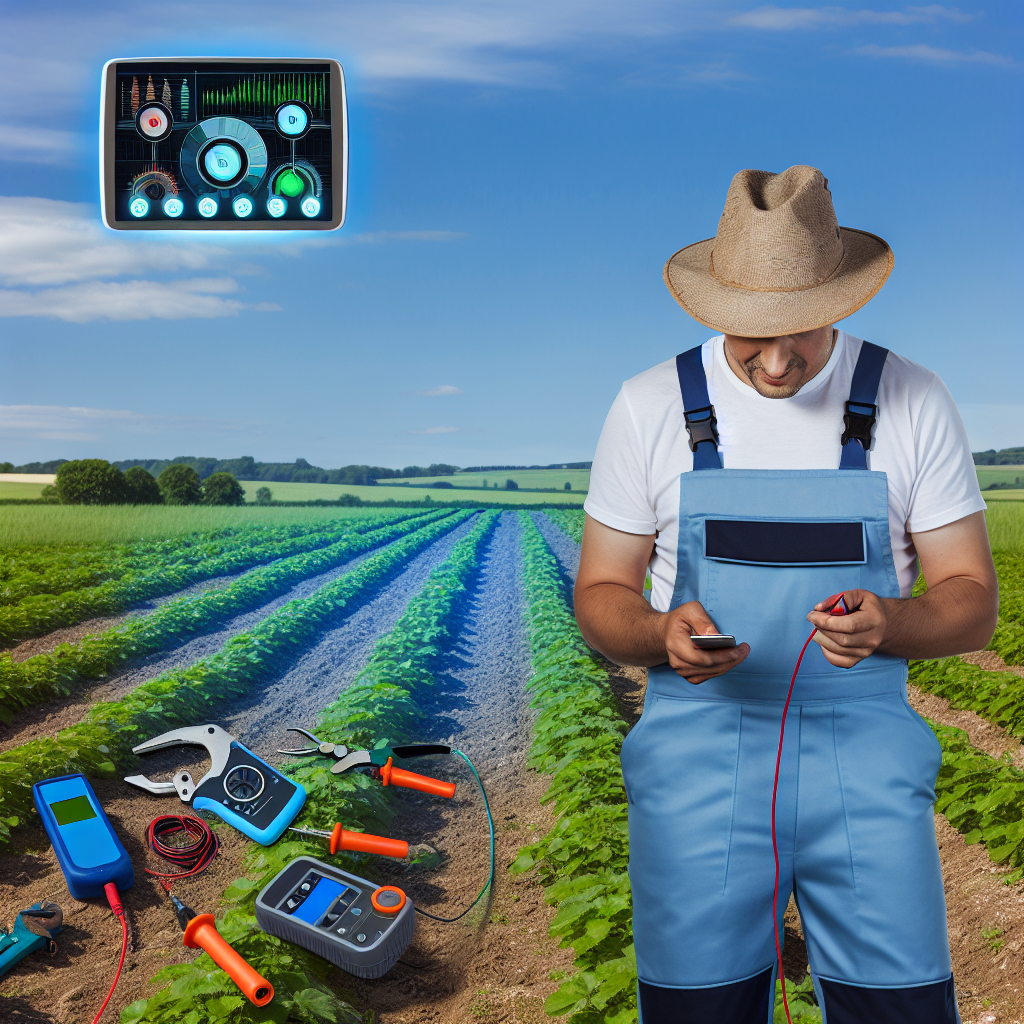
Case Studies: Successful Implementation of Smart Irrigation in Various Regions
California’s Central Valley
In California’s Central Valley, farmers adopted smart irrigation to conserve water.
The system uses sensors to monitor soil moisture levels.
This data helps optimize watering schedules based on plant needs.
As a result, farmers reported saving up to 30% on water usage.
Moreover, crop yields improved significantly, demonstrating sustainability.
Israel’s Agricultural Innovations
Israel leads the way in smart irrigation technology.
The country implements advanced drip irrigation systems.
These systems deliver water directly to the plant roots.
This method reduces evaporation and runoff effectively.
In turn, it has helped Israel grow crops in arid conditions efficiently.
Australia’s Drought Management
Australia faces regular droughts, prompting innovative irrigation solutions.
Farmers use automated irrigation systems with weather data integration.
This technology adjusts water use based on rainfall forecasts.
Showcase Your Farming Business
Publish your professional farming services profile on our blog for a one-time fee of $200 and reach a dedicated audience of farmers and agribusiness owners.
Publish Your ProfileConsequently, farmers sustain crop production even in dry spells.
Furthermore, this approach enhances environmental stewardship.
India’s Organic Farming Movement
In India, smart irrigation has transformed organic farming practices.
Smallholder farmers utilize solar-powered irrigation systems.
These systems operate independently from the grid.
Farmers can schedule irrigation according to their crop’s specific needs.
This method has increased production while preserving water resources.
Spain’s Efficient Water Use
Spain showcases the use of precision irrigation in vineyards.
Technology monitors soil and weather conditions in real-time.
Vineyard managers adjust irrigation practices based on data insights.
This leads to better grape quality and reduced water consumption.
Consequently, Spanish vineyards have become models of efficiency.
Find Out More: Smart Irrigation Maintenance Best Practices
Future Trends in Smart Irrigation
Advancements in Sensor Technology
New sensor technologies enhance data accuracy in irrigation systems.
These advancements improve soil moisture detection capabilities.
Wireless sensors allow for real-time monitoring of irrigation needs.
Consequently, farmers can make informed decisions quickly.
Integration of Artificial Intelligence
Artificial intelligence transforms how we manage irrigation.
AI algorithms analyze data to predict optimal irrigation schedules.
This technology reduces water waste significantly.
Farmers can expect higher crop yields through efficient resource use.
Increased Use of Drones
Drones play a crucial role in smart irrigation systems.
They provide high-resolution imagery to assess crop health.
This data helps farmers determine specific irrigation needs.
As a result, they can apply water more precisely.
Development of Automated Systems
Automated irrigation systems are becoming more prevalent.
These systems adjust water delivery based on real-time data.
They respond to changing weather conditions promptly.
This technology leads to more sustainable farming practices.
Focus on Sustainability
Smart irrigation emphasizes sustainable agriculture practices.
Environmentally friendly systems conserve water efficiently.
Farmers are increasingly adopting sustainable technologies.
These practices help combat the effects of climate change.
Emerging Research Areas
Research focuses on enhancing smart irrigation effectiveness.
Innovative materials for water delivery are actively being tested.
Studies are exploring the economic impacts of smart technologies.
Moreover, collaboration among agricultural scientists is increasing.
The Role of Government Policies and Incentives in Promoting Smart Irrigation Technologies
Understanding the Importance of Smart Irrigation
Smart irrigation technologies significantly enhance water use efficiency in agriculture.
They help farmers adapt to changing climate conditions and resource availability.
Additionally, these technologies contribute to sustainable farming practices.
Showcase Your Farming Business
Publish your professional farming services profile on our blog for a one-time fee of $200 and reach a dedicated audience of farmers and agribusiness owners.
Publish Your ProfileThe Impact of Government Policies
Government policies play a crucial role in promoting smart irrigation technologies.
They often provide the framework for research and development efforts.
Furthermore, supportive regulations can facilitate the adoption of innovative practices.
For instance, funding programs can ease financial burdens for farmers investing in new equipment.
Incentives for Farmers
Various incentives encourage farmers to adopt smart irrigation methods.
These may include tax credits, grants, or low-interest loans.
Additionally, subsidies can lower the cost barrier for implementing advanced technologies.
Local governments may also offer training programs to educate farmers about new systems.
Case Studies of Successful Implementation
Numerous countries have successfully implemented policies supporting smart irrigation.
In Israel, extensive policy frameworks fostered the development of advanced irrigation technologies.
This resulted in major improvements in agricultural productivity and water conservation.
Similarly, California’s initiatives have facilitated the adoption of drip irrigation in vineyards.
Challenges and Solutions
Despite progress, challenges still exist in promoting smart irrigation technologies.
Some farmers may resist changing established practices due to a lack of awareness.
To address this, government outreach programs must emphasize the benefits of modernization.
Furthermore, collaboration between stakeholders can create a support network for adopters.
The Future of Smart Irrigation Policies
Looking ahead, governments will need to adapt policies to fit evolving technological landscapes.
Continuous investment in research will drive innovation in irrigation techniques.
Moreover, policies must remain flexible to accommodate new challenges, such as climate change.
Ultimately, a proactive approach will maximize the benefits of smart irrigation solutions.
Additional Resources
Agriculture Innovation: 10 Tech Trends to Watch in 2023 …
Precision Agriculture in the Digital Era: Recent Adoption on U.S. Farms

